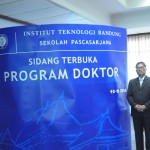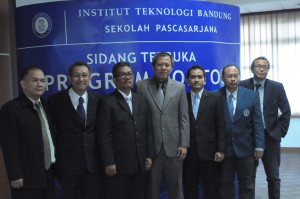 Dr. Evo Harandja had been working for his research since 5 years ago. At the beginning he is very interested in innovation management. After doing literature review, he come out with more concrete idea to relate innovation, marketing, and service excellence. This task is not easy under dynamic capability theory that has been studies from different angles. Finally, he is able to crystallize a research report entitled “Dynamic Marketing Capability and Service Innovation Capability for Service Excellence in the Hotel Industry”.
Dr. Evo Harandja had been working for his research since 5 years ago. At the beginning he is very interested in innovation management. After doing literature review, he come out with more concrete idea to relate innovation, marketing, and service excellence. This task is not easy under dynamic capability theory that has been studies from different angles. Finally, he is able to crystallize a research report entitled “Dynamic Marketing Capability and Service Innovation Capability for Service Excellence in the Hotel Industry”. Dr. Evo Harandja had been working for his research since 5 years ago. At the beginning he is very interested in innovation management. After doing literature review, he come out with more concrete idea to relate innovation, marketing, and service excellence. This task is not easy under dynamic capability theory that has been studies from different angles. Finally, he is able to crystallize a research report entitled “Dynamic Marketing Capability and Service Innovation Capability for Service Excellence in the Hotel Industry”.
Dr. Evo Harandja had been working for his research since 5 years ago. At the beginning he is very interested in innovation management. After doing literature review, he come out with more concrete idea to relate innovation, marketing, and service excellence. This task is not easy under dynamic capability theory that has been studies from different angles. Finally, he is able to crystallize a research report entitled “Dynamic Marketing Capability and Service Innovation Capability for Service Excellence in the Hotel Industry”.
This study addresses three objectives:
1. To explore how the hotel industry in Bandung (3-star to 5-star) can survive and succeed in achieving their service excellence using the capabilities of the dynamic marketing and service innovation,
2. To test the conceptual framework that emerged from the review of literature that illustrates how dynamic marketing capability and service innovation capability and their interaction works through the activities in the hotel industry in Bandung that will support in achieving service excellence and confirm in the other hotels,
3. To contribute on the knowledge of the hotel industry in Bandung. This research model studies the interaction between DMC, SIC, and its support on service excellence.
This model contributes to the existing literature in several ways.
1. The first key contribution of this work is its inclusion of the concept of dynamic capabilities; that hotels are able to compete not only due to their ability to exploit their existing competence and capabilities, but also thanks to their ability to renovate and develop their organizational capabilities. Therefore, this study argue that in order to maintain service excellence it is not enough for hotels to be in possession of valuable capabilities; hotels also require dynamic capabilities to develop and renovate their organizational competence and capabilities.
2. The analysis of the interaction between a hotel’s capabilities (DMC and SIC) allows us to see what happens inside the proposed “black box” for achieving service excellence. This interaction forms the proposed dynamic capability. To confirm that the interaction between the two proposed capabilities really is a dynamic capability, it is necessary to test whether the characteristics of dynamic capabilities are fulfilled as expected in the specific cases that are studying.
3. This study seeks to provide the empirical data for the hotel industry to reveal variables dynamic marketing capability such as: market sensing, learning, and market targeting and positioning; and service innovation capability such as: sensing, seizing, and transforming.
Dr. Hariandja is a hard working person and keen to explore new possibilities that would enable him to become a successful scholar in the future. As a lecturer, I hope he continues his research endeavor and publication in international journals. At this important moment, I would like to thank the team of supervisors: Dr. Dwi Larso and Dr. Reza Nasution who eagerly share their knowledge and sharpen the research capability of Dr. Hariandja.
I also would like to express my gratitude to the examiners: Prof. Ernie Sule, Dr. Bambang Rudito, and Dr. Donald Lantu, as well as the convener of the viva: Prof. Utomo Sarjono Putro and the representative of the School of Postgraduate at ITB. Finally, many thanks are given to the family members of Dr. Hariandja, lectures of DSM, and HoD of DSM.
This study addresses three objectives:
1. To explore how the hotel industry in Bandung (3-star to 5-star) can survive and succeed in achieving their service excellence using the capabilities of the dynamic marketing and service innovation,
2. To test the conceptual framework that emerged from the review of literature that illustrates how dynamic marketing capability and service innovation capability and their interaction works through the activities in the hotel industry in Bandung that will support in achieving service excellence and confirm in the other hotels,
3. To contribute on the knowledge of the hotel industry in Bandung. This research model studies the interaction between DMC, SIC, and its support on service excellence.
This model contributes to the existing literature in several ways.
1. The first key contribution of this work is its inclusion of the concept of dynamic capabilities; that hotels are able to compete not only due to their ability to exploit their existing competence and capabilities, but also thanks to their ability to renovate and develop their organizational capabilities. Therefore, this study argue that in order to maintain service excellence it is not enough for hotels to be in possession of valuable capabilities; hotels also require dynamic capabilities to develop and renovate their organizational competence and capabilities.
2. The analysis of the interaction between a hotel’s capabilities (DMC and SIC) allows us to see what happens inside the proposed “black box” for achieving service excellence. This interaction forms the proposed dynamic capability. To confirm that the interaction between the two proposed capabilities really is a dynamic capability, it is necessary to test whether the characteristics of dynamic capabilities are fulfilled as expected in the specific cases that are studying.
3. This study seeks to provide the empirical data for the hotel industry to reveal variables dynamic marketing capability such as: market sensing, learning, and market targeting and positioning; and service innovation capability such as: sensing, seizing, and transforming.
Dr. Hariandja is a hard working person and keen to explore new possibilities that would enable him to become a successful scholar in the future. As a lecturer, I hope he continues his research endeavor and publication in international journals. At this important moment, I would like to thank the team of supervisors: Dr. Dwi Larso and Dr. Reza Nasution who eagerly share their knowledge and sharpen the research capability of Dr. Hariandja.
I also would like to express my gratitude to the examiners: Prof. Ernie Sule, Dr. Bambang Rudito, and Dr. Donald Lantu, as well as the convener of the viva: Prof. Utomo Sarjono Putro and the representative of the School of Postgraduate at ITB. Finally, many thanks are given to the family members of Dr. Hariandja, lectures of DSM, and HoD of DSM.




